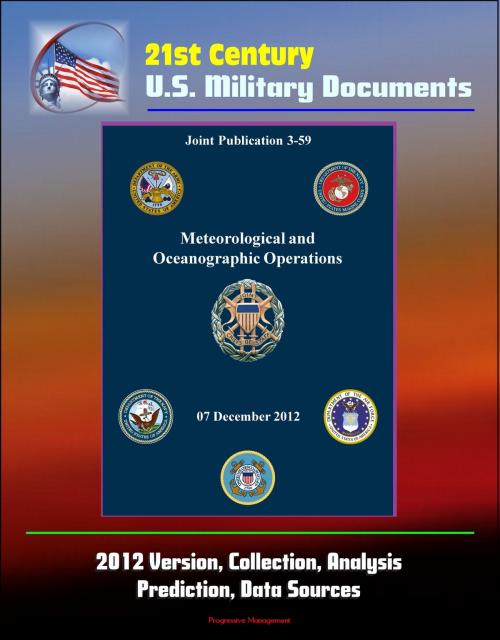21st Century U.S. Military Documents: Meteorological and Oceanographic Operations (Joint Publication 3-59) - 2012 Version, Collection, Analysis, Prediction, Data Sources
Nonfiction, Science & Nature, Science, Other Sciences, Meteorology| Author: | Progressive Management | ISBN: | 9781301920570 |
| Publisher: | Progressive Management | Publication: | September 11, 2013 |
| Imprint: | Smashwords Edition | Language: | English |
| Author: | Progressive Management |
| ISBN: | 9781301920570 |
| Publisher: | Progressive Management |
| Publication: | September 11, 2013 |
| Imprint: | Smashwords Edition |
| Language: | English |
This publication sets forth the joint doctrine for the planning and execution of meteorological and oceanographic operations in support of joint operations throughout the range of military operations.
Joint meteorological and oceanographic (METOC) operations are critical to a commander's awareness of the operational environment and the ability to exploit that awareness to gain an advantage during military operations.
Meteorological and oceanographic (METOC) forces work cooperatively within the Department of Defense community and across interorganizational lines to share and obtain information to provide timely, accurate, relevant, and consistent METOC support to joint force commanders (JFCs). METOC examines the whole range of atmospheric (weather) and oceanographic phenomena, from the sub-bottom of the Earth's oceans up to the top of the atmosphere and the space environment (space weather).
Understanding METOC Terminology - METOC is a term used to convey all meteorological, oceanographic, and space environmental factors as provided by the Services, support agencies, and other sources. These factors include the whole range of atmospheric (weather) and oceanographic phenomena, from the sub-bottom of the Earth's oceans up to the top of the atmosphere and the space environment (space weather).
METOC Key Functions - Joint METOC operations focus on two key functions: characterization of the environment and exploitation of environmental information to gain an operational advantage and ensure the safety of operational forces.
METOC Principles - The principles of accuracy, consistency, relevancy, and timeliness are the cornerstone of joint METOC operations. When characterizing the environment, the principles of accuracy and consistency are paramount to collection, analysis, and prediction processes. The guiding principles of relevancy and timeliness are critical in tailoring and integrating METOC products for the commander.
This publication sets forth the joint doctrine for the planning and execution of meteorological and oceanographic operations in support of joint operations throughout the range of military operations.
Joint meteorological and oceanographic (METOC) operations are critical to a commander's awareness of the operational environment and the ability to exploit that awareness to gain an advantage during military operations.
Meteorological and oceanographic (METOC) forces work cooperatively within the Department of Defense community and across interorganizational lines to share and obtain information to provide timely, accurate, relevant, and consistent METOC support to joint force commanders (JFCs). METOC examines the whole range of atmospheric (weather) and oceanographic phenomena, from the sub-bottom of the Earth's oceans up to the top of the atmosphere and the space environment (space weather).
Understanding METOC Terminology - METOC is a term used to convey all meteorological, oceanographic, and space environmental factors as provided by the Services, support agencies, and other sources. These factors include the whole range of atmospheric (weather) and oceanographic phenomena, from the sub-bottom of the Earth's oceans up to the top of the atmosphere and the space environment (space weather).
METOC Key Functions - Joint METOC operations focus on two key functions: characterization of the environment and exploitation of environmental information to gain an operational advantage and ensure the safety of operational forces.
METOC Principles - The principles of accuracy, consistency, relevancy, and timeliness are the cornerstone of joint METOC operations. When characterizing the environment, the principles of accuracy and consistency are paramount to collection, analysis, and prediction processes. The guiding principles of relevancy and timeliness are critical in tailoring and integrating METOC products for the commander.















